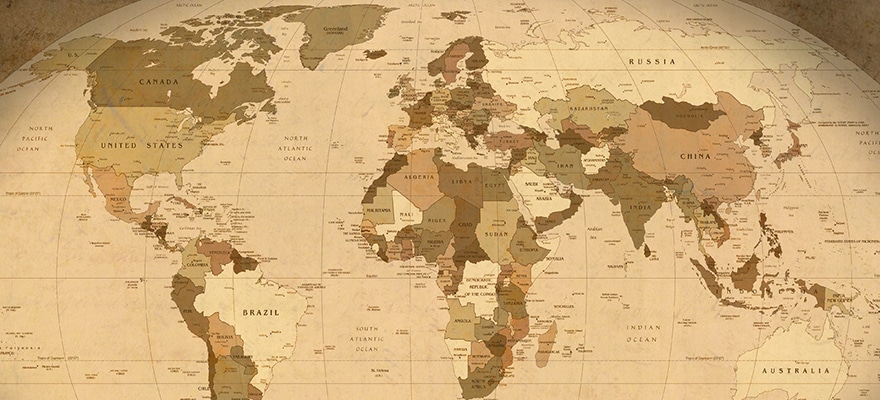This guest article was written by William Laraque who is the Managing Director of US-International Trade Services.
The growth of e-commerce in global trade is inexorably tied to the sale of capital goods.
ERP System
The financial world has been regaled since 1979 with tales of the inevitable 'digitization', 'dematerialization' of global trade documents pursuant to attaining the holy grail of a fully automated, seamless integration of the corporate ERP system into electronic purchase orders in the supply chain, which when matched with the appropriate invoices, automatically results in engaging a complementary financial supply chain, trade settlement and the transfer of funds between buyer and seller.
All other services such as freight forwarding, customs house brokerage, legal agreement structuring, export controls, customs clearance, Compliance , determination of credit-worthiness, payment of duties and taxes, documentation, etc., etc., are seen as being ancillary to the actual trade process. These visions remain unfulfilled today.
Despite Bolero, the SWIFT BPO, 'four corner interoperability', the ICC 'rule books', digital documents, the e-UCP and an important enough sounding lexicon to fill manuals, the vision of a fully automated international trade finance and settlement process supported by logistics, remains an unfulfilled dream.
The level of collaboration that has to occur among buyers, sellers and the entire supporting ecosystem in order to achieve straight-through-processing in international trade has been approached by export credit insurance companies, but not through banks despite nearly 4 decades of effort on the part of banks, Fintech companies, traditional financial institutions and many other agencies.
Alternative Forms of Trade Financing
The closest the financial industry has gotten to straight-through-processing of trade finance and settlement of orders generated from an ERP system and the processing and financing of export orders and subsequent invoices of a seller matched to the purchase orders of a buyer, is found in the progression of World Trade Center Associates' 'automated trade settlement engine', succeeded by TradeCard, merged with GT Nexus and finally purchased by Infor.
Essentially, receivables which are insured with export credit insurance against political and commercial risks, are discounted or purchased by a factor or discounted without recourse to the exporter in a practice called forfaiting. Forfaiting has never caught on in the US as it has in Europe.
Nevertheless, the purchase of and discounting of insured export receivables have constituted the bulk of the alternatives to LCs in financing cross-border trade. In the case of the World Trade Center Associates-TradeCard-GTNexus-Infor continuum, it is the French quasi-public insurance provider Coface which has stolen the trade finance bank lunch. Euler-Hermes and Atradius have also figured in this 'theft'.
Transition and Competition
E-commerce companies that enter the global market are being taught valuable lessons in what is culturally appropriate to various localities.
The cross-border progression of e-commerce platforms has not been an easy deployment. Uber and Amazon were outmaneuvered in China by both native-grown e-commerce clones and innovations like WeChat, Didi Chuxing and Alibaba. In Southeast Asia, Lazada and Grab (Taxi) in Singapore and Flipkart and SNAPDEAL in India are starting to mount a competitive challenge to Amazon and Alibaba. Grab Taxi in Singapore has mounted a strong challenge to Uber.
The 600 million person-strong Southeast Asian market is at stake. Infrastructure, logistics and trade finance are closely linked as anyone who has read Incoterms 2010 knows.
Trade Barriers
The tariff barriers to trade have fallen as successive rounds of the GAAT (Gentleman's Agreement on Tariffs and Trade) have lowered the dutiesand taxes on broad categories of the harmonized tariff system. The invisible or regulatory barriers to the expansion of e-commerce companies have grown to be much more formidable and daunting.
For example, in April of this year, Apple refused to provide its source codes to China. As a result, China has shut down Apple's online book and movie services this August.
China is such a daunting challenge to Amazon, Apple and other e-commerce firms that they are now concentrating on India and Southeast Asia as alternative e-commerce markets.
Analysts say that e-commerce in India, the world’s second-most-populous country, could take off, with one estimate that online sales will reach $127 billion in 2025 from $11.2 billion last year. That’s small compared to China, but the growth will spur more investment in the logistics infrastructure India lacks to serve domestic demand and to efficiently connect the country’s interior to global supply chains.
It will be interesting to see how the inevitable politically-infused rejection of TPP by the US public will affect the opportunities for US e-commerce companies to scale in Southeast Asia.
Capital Goods
The sale of capital goods falls within a strategic area of global trade. It falls within the gap between the sale of consumer goods and structured trade finance for projects. E-commerce is not now commonly utilized as a means of financing trade in capital goods.
The ease and efficiency with which goods are bought, sold and delivered via e-commerce is compelling. It is inevitable that this ease and efficacy will be applied to the sale of capital goods.
Unlike the sale of consumer goods, the financing of the sale of capital goods will encompass every trade finance-related service, some 30 services at last count.
The conflation of services, both primary and support, will involve an extraordinary collaboration of the service providers and banks, logistics companies and other owners of systems essential to the process. It is estimated that it will take 10-15 years to achieve this dream. Collaboration among disparate but related disciplines will be key.






















